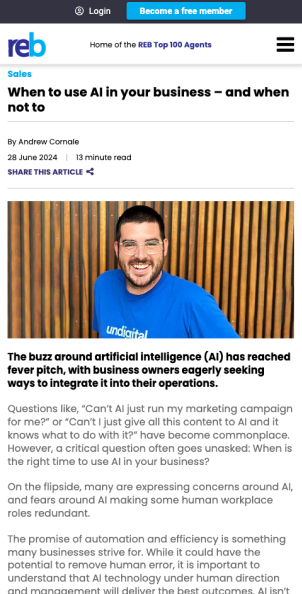
The buzz around artificial intelligence (AI) has reached fever pitch, with business owners eagerly seeking ways to integrate it into their operations.
Questions like, “Can’t AI just run my marketing campaign for me?” or “Can’t I just give all this content to AI and it knows what to do with it?” have become commonplace. However, a critical question often goes unasked: When is the right time to use AI in your business?
On the flipside, many are expressing concerns around AI, and fears around AI making some human workplace roles redundant.
The promise of automation and efficiency is something many businesses strive for. While it could have the potential to remove human error, it is important to understand that AI technology under human direction and management will deliver the best outcomes. AI isn’t here to manage or run your tasks, and its application must be strategic and well considered.
The efficacy or success of AI hinges on the quality of inputs it receives – unsurprisingly, the best inputs will yield the best outputs.
Here are my thoughts on how AI can benefit your business and where it might fall short.
When to use AI
Process automation: Monotonous, repetitive tasks are where AI shines brightest. If your organisation handles tasks that follow a clear formula or process, with the right training (that’s right, AI does need to be trained), AI may be able to take over. For instance, transforming data from one format to another can be seamlessly automated and managed by AI. Businesses can save time and reduce the risk of human error.
Thought starters: It’s time to get real – who isn’t using ChatGPT these days? And, fair play, as AI is a fantastic tool for sparking ideas. By inputting prompts like “what are five ways I can say …” or asking for inspiration on a topic, AI technologies like ChatGPT can generate creative thought starters and spark creative ideas. AI also loves to analyse data and statistics in order to provide information, trends and insights, which can help inform strategic business decisions. Here, AI plays a great supporting role.
Thought summarising: If you’ve ever been stuck trying to simplify an idea or summarise long-form articles or content, AI can definitely be your friend. Whether you’re preparing a presentation, drafting a board document, or working to land on a specific word count, AI can help streamline your thoughts and save you valuable time.
Customer communication: AI has the potential to improve the way businesses communicate with their customers. From chatbots that handle customer enquiries to more complex AI tools that craft detailed responses to common questions, AI can maintain high levels of customer service without constant human intervention. To get this right will need some training – it will need to understand style guides, tone of voice, and more. For busy executives, AI might be able to offer a cost-effective solution to help you respond to emails and questions quickly and efficiently.
Sales automation: One of the big ones. Emerging AI technologies are helping to improve sales processes. AI voice cloning can genuinely recreate your voice, and leave voicemails for potential customers. Trained correctly, these technologies can do this automatically, saving you the effort of making individual calls. Similarly, AI-written automated emails can help maintain consistent communication with potential clients.
When to avoid using AI
While AI offers many benefits, it is crucial to recognise the limitations. AI should be used to amplify and support your existing processes and efforts, not replace them. I recommend avoiding AI in some business cases, as it won’t always be your friend.
Creative and strategic thinking: AI is based on algorithms and mathematics; it can learn patterns but can’t replace human creativity and strategic thinking (yet!). Business owners shouldn’t expect AI to devise innovative marketing campaigns or business strategies from scratch. The reality is, they won’t pass the litmus test compared to the work of intelligent, creative professionals.
Personal touch in customer relations: While AI can handle routine (or basic) customer interactions, it is not a person, and will absolutely flop when it comes to authenticity and the genuine personal touch that keeps customers returning. High-stake interactions, complex problem-solving and negotiations need smart people on them, not AI.
Niche or highly specialised tasks: AI tools are typically trained on vast data sets, which might not cover niche or highly specialised areas adequately. Specialisation is a human skill and something AI won’t be able to match any time soon.
Over-reliance without understanding: This is an easy trap to fall into. Blindly implementing AI without understanding its workings and implications can lead to poor results. It’s essential for business managers to have a foundational understanding of how AI tools function to set realistic expectations and use them effectively, and to train any AI tools they, or their team, will be using.
AI is powerful technology that, when used correctly, can drive efficiency and innovation in your business, not a replacement for human intelligence and creativity.
Andrew Cornale is the co-founder and director of experience at UnDigital.



